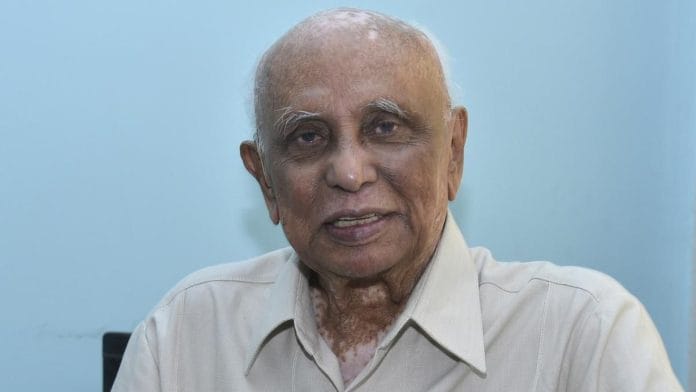New Delhi: Retired Karnataka High Court judge K.S. Puttaswamy, the face of the landmark right to privacy case in the Supreme Court in 2017, passed away at the age of 98 Monday.
Justice K.S. Puttaswamy (Retd.) & Anr. vs. Union of India & Ors. (2017), the landmark decision which held that the right to privacy is protected as a fundamental right under articles 14, 19 and 21 of the Constitution of India, is also known as the Right to Privacy verdict.
Over 12 years ago in 2012, Justice Puttaswamy was one of the first litigants to challenge the then United Progressive Alliance (UPA) government’s Aadhaar scheme. He had challenged the validity of Aadhaar, a unique 12-digit identification number first introduced in 2009.
In a petition, Justice Puttaswamy had asserted that the framework violated the fundamental right to privacy, prompting the SC to set up a nine-judge bench to look into the correctness of past judgments which had ruled that privacy was not a fundamental right.
On 24 August 2017, the nine-judge bench passed the Right to Privacy verdict. The bench comprised the then Chief Justice of India (CJI) J.S. Khehar and justices J. Chelameswar, S.A Bobde, R.K. Agrawal, R.F. Nariman, A.M. Sapre, D.Y. Chandrachud, S.K. Kaul and S. Abdul Nazeer.
After the verdict, Justice Puttaswamy told News18 that he felt “vindicated” and called it a “monumental judgment”.
“I am also a part of the system. I also fought for it. It has resulted in good for the general public and myself also. I am fully satisfied with the result,” a News18 report quoted him as saying.
Justice Puttaswamy was born 6 February 1926, and studied at Maharaja’s College, Mysore and Government Law College, Bangalore. He enrolled as a lawyer on 7 January 1952, and was elevated to the Karnataka HC as a judge on 28 November 1977.
He went on to become the first vice-chairperson of the Bangalore bench of the Central Administrative Tribunal (CAT), a position he held from September 1986 to October 1989.
In 1988, he resigned from his post as the one-man commission of inquiry instituted by the Karnataka government into the politically sensitive MD (Doctor of Medicine) seat scandal which involved the then chief minister Ramakrishna Hegde’s son.
His resignation came after an editorial by The Indian Express claimed that the Centre had reportedly offered him the post of the president of the Customs, Excise And Service Tax Appellate Tribunal (CESTAT), insinuating that this was with an eye on the outcome of the inquiry.
He was also appointed as the chairperson of the Andhra Pradesh State Commission for Backward Classes in 1994.
The Lokayukta law letters
Justice Puttaswamy’s commitment to public good went beyond the Aadhaar and right to privacy case.
In January 2010, he wrote two letters to the Law Commission of Karnataka, suggesting amendments to the Karnataka Lokayukta Act, 1984 and the Karnataka Lokayukta Rules, 1985.
Among other things, these letters spoke of a thorough overhaul of the Lokayukta Act, and a provision giving third parties the opportunity to be heard if they are affected by the decision of lokayuktas or upalokayuktas appointed to enquire into allegations against public functionaries.
While he had also recommended that the chief minister should be excluded from the purview of the Lokayukta Act, the commission did not agree and felt that “it would be a retrograde step to exclude Chief Minister from the purview of Lokayukta Act”.
Impact of Right to Privacy verdict on Section 377, phone tapping
The judgment upholding right to privacy was hailed, not only for having placed the ‘individual’ at the heart of the issue but also as having the potential to transform the landscape of women’s entitlements under the law.
The verdict has left an indelible mark on several important legal questions that have since emerged before the SC as well as high courts.
These include decriminalising adultery, protecting transgender persons’ rights and safeguarding people against arbitrary surveillance through phone tapping.
The most prominent impact of the Right to Privacy verdict was felt on 6 September 2018, when the SC struck down Section 377 of the Indian Penal Code (IPC), a law which criminalised same-sex relations between consenting adults in India. The 2017 verdict on the right to privacy had asserted that “sexual orientation is an essential attribute of privacy”.
Advocate Avdhesh Kumar Singh, the current additional advocate general for Chhattisgarh—who was part of the team of lawyers representing Justice Puttaswamy in the SC in the right to privacy case—has termed the retired judge a “visionary”.
“I haven’t ever seen a legendary person like him in our profession,” Singh told ThePrint. “He was extremely down to earth, and made a significant contribution to ensuring how the country can be protected. He worked with an approach of national integration.”
(Edited by Radifah Kabir)






